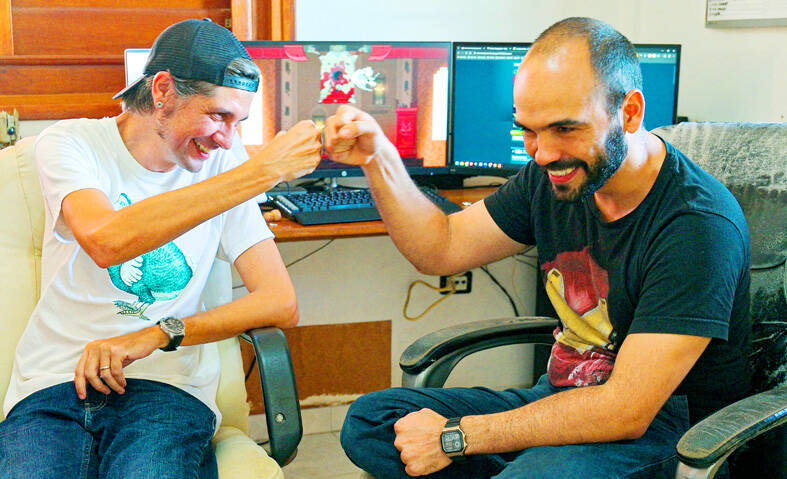-
Jordan Bertrand/AFP, Havana
Cuba's first independent video game launched internationally this week after its creators leveled up from an epic real-world quest to fight sanctions, battle internet connectivity demons and survive economic turmoil.
Saviorless is a 2D game with hand-drawn illustrations that transports players to a dark fantasy world where they battle monsters and solve puzzles to uncover the mysteries of the Isle of Smiles.
Like the characters, creators Josuje Paglieri and David Darias had to overcome numerous obstacles to achieve what at times seemed impossible in the communist island nation.

Photo: AFP
“This project was born at a historic moment,” said Paglieri, a graphic artist who first came up with the idea in 2016. At the time, relations between Havana and Washington were cooling under then-U.S. President Barack Obama.
The effort received support from U.S. foundations and crowdfunding, and Pagliery traveled to the United States, where his dream of creating an independent Cuban video game received media coverage.
At the same time, in Cuba, the internet had previously only been available in public places at a high cost, but in 2018 it became possible to use the internet on mobile phones, dramatically lowering the cost of connection.
But this “bright period” was followed by a “perfect storm to cancel the project,” Paglieri said.
Political tensions have returned under US President Donald Trump, who has tightened economic sanctions. The first programmers tasked with developing the game emigrated, and Cuba plunged into its worst economic crisis in decades after the coronavirus pandemic, marked by shortages and power outages.
“Instability characterized this project throughout its development,” says Darias, 35, a former professor at the University of Havana who now works from home as an independent programmer.
With Cuba under a U.S. embargo since 1962, financial constraints, disputes over the game's name, suspicions and technical challenges all presented obstacles.
Their software didn't always work on slow internet connections, sanctions required them to connect through virtual private networks to use banned programs, and power outages complicated backups.
“The worst two times I've had one, I've lost not only my last minute job, but my entire week's work,” said Darias, who lost power during the backup.
After four years of work, their finances had run out, and after sending hundreds of letters to international publishers and getting no response, the two friends decided to leave behind “the traces of all our efforts.” Paglieri said he offered a free demo to at least leave people with the same problem.
That's when Dear Villagers, a games publisher based in the south of France, took note of the efforts of the Cuban people and decided to help them “make their dreams come true,” says the company's founder. Francis England said.
“We've always had a desire for original projects. We love the artistic touch and the game spoke to us,” he said, adding that the two have “achieved crazy things.” praised the developer's tenacity.
Luis Antonio Noa, a 27-year-old who runs a YouTube channel dedicated to gaming, said the project has become something of a “legend” among Cuba's gamer community because it took so long to come to fruition. That's it.
Carlos Óscar Anaya, 29, a partner on the channel, said Cuban gamers mainly play free games, pirated games, and domestically produced games, but that Cuban video games are “more educational.'' He said he is used to being a “target”.
Saviorless is “a game with a dark plot that's only meant to entertain,” he said, highlighting its “beautiful graphics and music.”
He said he hopes the work “reaches a wide audience and puts Cuba on the video game map” around the world.
Comments are moderated. Please keep your comments relevant to the article. Speech containing abusive or obscene language, personal attacks of any kind, or propaganda will be removed and the user will be banned. The final decision is at the discretion of Taipei Times.


